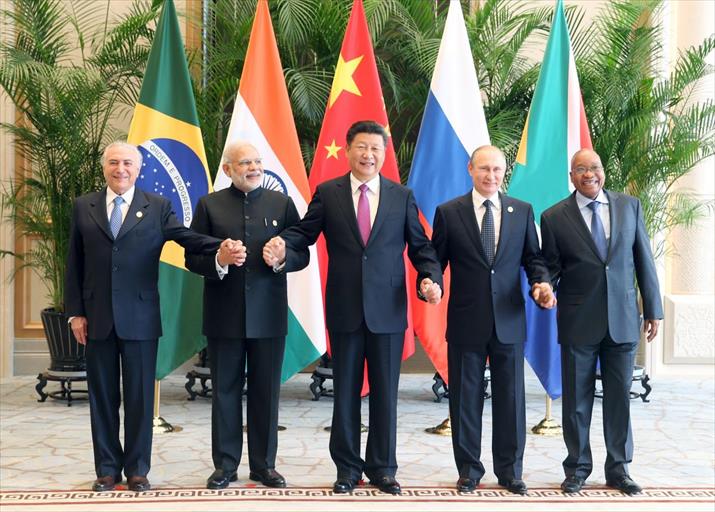|
||||||||||
| Home Nation World Business Opinion Lifestyle ChinAfrica Multimedia Columnists Documents Special Reports |
|
||||||||||
| Home Nation World Business Opinion Lifestyle ChinAfrica Multimedia Columnists Documents Special Reports |
| Opinion |
| BRICS Paving the Way for African Development |
| South Africa has played an active role in promoting cooperation between BRICS members and African countries. |
| By Wang Lei | VOL.9 September 2017 ·2017-09-05 |

THE Ninth BRICS Summit will be held in China's Xiamen City in early September. The last time China hosted the BRICS Summit was in 2011, when South Africa was accepted as a full member. South Africa's accession not only strengthens the BRICS countries' direct links with the African continent, but also broadens BRICS in terms of economic aggregates, population and area. More importantly, the move has greatly enhanced the representativeness of the mechanisms as its coverage expanded from Asia, Europe and America to Africa, making it an economic cooperation mechanism for emerging economies covering the whole world.
Since then, South Africa, seen by many as the "gateway of Africa," plays an important role in the BRICS mechanism, through which, it can also enhance its own national strength, achieve stronger growth in infrastructure, agriculture, mining, and manufacturing, and establish strategic partnerships with major emerging powers.
South Africa is also a strong driver of the "BRICS countries-Africa" connections and the overall development of Africa. Under this framework, South Africa is vigorously promoting regional integration and infrastructure connectivity on the African continent.
Development mechanism
Strengthened cooperation with African countries has, in return, promoted development and improvement of BRICS mechanism. After South Africa joined in, the BRICS members have established a dialogue mechanism between BRICS countries and other developing countries, which have become the main element of the BRICS leaders' annual summit.
The idea was initiated and facilitated by South Africa when it hosted the Fifth BRICS Summit in Durban 2013. The theme of the Durban Summit identified as BRICS and Africa: Partnership for Development, Integration and Industrialization directly reflects three main objectives: to strengthen cooperation between South Africa and other BRICS countries, to strengthen the cooperation among the BRICS countries and to strengthen the cooperation between BRICS countries and Africa, vigorously promoting the development of Africa.
To achieve these objectives, South Africa invited leaders from 12 African countries including Senegal, Uganda, Equatorial Guinea and Ethiopia, and the AU Commission to participate in the BRICS Leaders-Africa Dialogue Forum held in Durban. At the forum, BRICS countries and African countries exchanged views and reached consensus on many areas under the theme of Unlocking Africa's Potential: BRICS and Africa Cooperation on Infrastructure. Since then, the rotating presidency of the BRICS countries has continued the tradition of organizing dialogue with regional leaders.
For the summit to be held in Xiamen, China also invited leaders from Egypt and Guinea, two developing countries in Africa, to participate in a dialogue with the leaders of the BRICS countries so as to increase Africa's voice on the global stage, promote cooperation between the BRICS countries and Africa as well as promoting Africa's development.
South-South cooperation platform
The five BRICS members are all emerging countries. As excellent examples of a new type of South-South cooperation, they show how emerging economies and developing countries can achieve common development through mutual cooperation. As developing countries with outstanding performance over the past decade, BRICS members have been resolutely safeguarding the interests of developing countries in the major global multilateral platforms, such as the United Nations, G20, the International Monetary Fund and the World Bank. BRICS can better represent the interests of developing countries on global multilateral occasions only if they maintain closer communication and consultation with Africa.
The BRICS nations, as important parts of the developing world, are not an independent group in the international political system. They should avoid division with the developing world, especially African countries, or they will be largely isolated from the international community. In addition, the African continent, which is poised to rise, has a large population, promising prospects and a huge market.

Advancing global development
Cooperation with Africa is vital to BRICS in building a global partnership for development. It was under the collective efforts of BRICS nations and the vast majority of African countries that the 2015 United Nations Sustainable Development Summit finally adopted the Post-2015 Development Agenda. The 2030 Agenda for Sustainable Development, formulated by the summit, is a programmatic document for international development cooperation, which guides the development of countries worldwide and international cooperation in the next 15 years.
During this summit, China also co-hosted the High-Level Roundtable on South-South Cooperation with the United Nations, with leaders and representatives from African countries, such as Benin, Egypt, Nigeria, South Africa, and Zambia, attending.
China is committed to building BRICS mechanism up as the most important platform for South-South cooperation and playing a leading and exemplary role in the global implementation of the 2030 Agenda for Sustainable Development.
Broader partnerships
Further strengthening cooperation with Africa is an important part of enriching the "BRICS Plus" model and building a broader partnership within the BRICS fold. BRICS has always been committed to dialogue and cooperation with other emerging market economies and developing countries in their quest for common development. It is essential to build and consolidate the "African friendship circle" for the BRICS countries and build a broader global partnership network by further consolidating cooperation with African countries in a variety of ways in the "BRICS Plus" model. Africa's voice can also be better heard in the international community by cooperating with BRICS countries on issues like climate change, global development and international financial system reform.
Under the "BRICS Plus" framework, more African countries have been encouraged to participate in the BRICS cooperation process to advance deeper cooperation. It not only underlines the openness and inclusiveness of BRICS cooperation, but also shows that BRICS is not a closed exclusive small club.
By deepening the development, integration and industrialization partnership between BRICS and Africa, the BRICS members will promote South-South cooperation, including cooperation with Africa, to a higher level, accelerate the implementation of the 2030 Agenda for Sustainable Development, and open up a brighter future for the economic and social development of developing countries.
| About Us | Contact Us | Advertise with Us | Subscribe |
| Copyright Beijing Review All rights reserved 京ICP备08005356号-5 京公网安备110102005860号 |